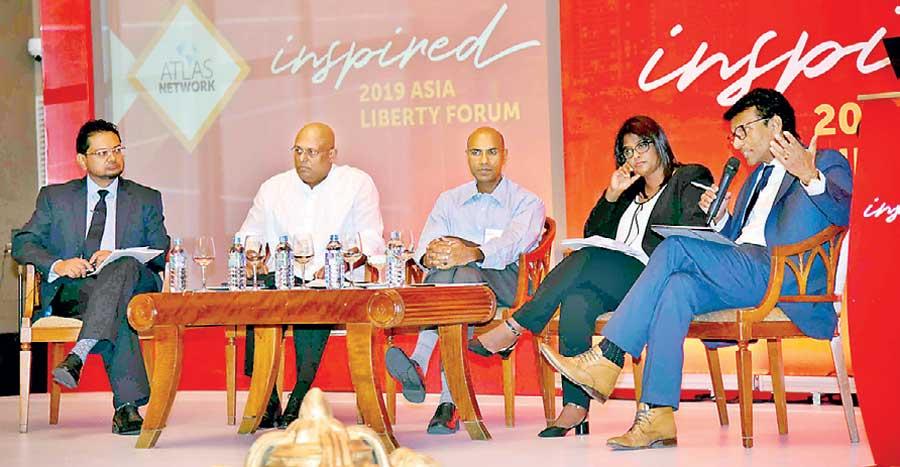05 Mar 2019 - {{hitsCtrl.values.hits}}

From right: National Agency for Public-Private Partnership Chairman Thilan Wijesinghe expresses his views in the presence of Verite Research Consultant Malathy Knight, Advocata Institute Resident Fellow Ravi Ratnasabapathy, Carson Cumberbatch Director Suresh Shah and Moderator Verite Research Executive Director Dr. Nishan de Mel
Pic by Samantha Perera
By Nishel Fernando
The country’s Finance Ministry should be empowered to deal with the ineffective director boards of the loss-making state-owned enterprises (SOEs), as notions of privatisation or public-private partnerships (PPPs) seem unrealistic, given the current political environment, according to National Agency for Public-Private Partnership Chairman Thilan Wijesinghe.
He proposed to set up advisory boards with majority composition of Finance Ministry officials for loss-making SOEs, to resolve the issue of ineffective boards in SOEs.
“What I’m proposing is, on the top layer of the boards of loss-making SOEs, put another layer of majority of Finance Ministry officials, in order to make sure that certain fiscal decisions cannot be taken by the boards in an irresponsible manner that is going on.
You can call it an advisory board or something else. I’m seeing it as an interim fix to solve the major problem of ineffective boards,”
he said.
Wijesinghe made these remarks taking part in a panel discussion themed ‘State of State Enterprises’, at the Asia Liberty Forum, held at The Hilton Colombo, last week.
According to the Finance Ministry, the total outstanding debt of the SOEs to banks during the first four months of 2018 was a staggering Rs.491 billion, while they recorded a net loss of Rs.9.36 billion during the same period.
Advocata Institute Resident Fellow Ravi Ratnasabapathy stressed that the government needs to carry out a proper census to find out the actual performance of the SOEs and their impact on the economy, as they even fail to comply with the basic reporting standards.
Wijesinghe reiterated that governance is the problem faced by the SOEs, leading to poor management and eventually to poor performance, as the boards are currently appointed by politicians while the Finance Ministry representatives in the boards don’t have much say.
He noted that the Finance Ministry has the necessary legal framework to improve the management of the SOEs.
“There are sufficient teeth in the Finance Act for the Finance Ministry to control these SOEs, at least to be better managed and better governed.
However, I have not seen yet a Finance Ministry that is assertive enough to take control of the rank mismanagement that is going on at the SOEs to get adequate returns on the investments that have been made on behalf of the people,” he said.
Though the privatisation of the SOEs seems to be an optimal solution to resolve their poor governance, Wijesinghe pointed out that it’s a not realistic approach in the current environment.
“The system is hardwired for the state and ministry concerned to keep control of the particular state assets and if the Finance Ministry or someone says to privatize, the line minister himself will instigate the trade unions and gather support against the inactive,” he said.
In addition, the shaping of public opinion on the issue also remains challenging as the public view privatisation unfavourably.
Hence, Wijesinghe stressed that the civil societies in particular have a role to play in shaping the public opinion on dissemination of the information on the burden of the loss-making SOEs to the public and to the country.
He also noted that rather than disposing the entire state entity, spinning off of underperforming assets in SOEs could be a viable option to mitigate the losses incurred by the SOEs.
“The selected assets within some of the SOEs can be transferred to private management, similar to the Hambantota port and thereby, the SLPA is saving US $ 70-80 million in debt servicing. My assertion is that you cannot privatize the state entity per say but can spin off whatever unproductive assets,” he said.
Wijesinghe pointed out that Building Materials Corporation is currently struggling to repay its debt worth of Rs.600 million, though it owns Rs.11 billion worth of land.
However, Carson Cumberbatch PLC Director Suresh Shah opined that the government should not get involved in the business of running businesses, as it has more important tasks to carry out and it is unfair to the rest of the players in a particular industry. “In general, the government shouldn’t be an owner, regulator and operator; you have a problem of level playing field across industries. The government has much larger tasks to carry on. Hence, the government shouldn’t exhaust its energy running supermarkets,” he said.
He also reminded that the private enterprises are much more efficient in resource allocation than the government.
15 Nov 2024 5 hours ago
15 Nov 2024 6 hours ago
15 Nov 2024 7 hours ago
15 Nov 2024 7 hours ago
15 Nov 2024 8 hours ago